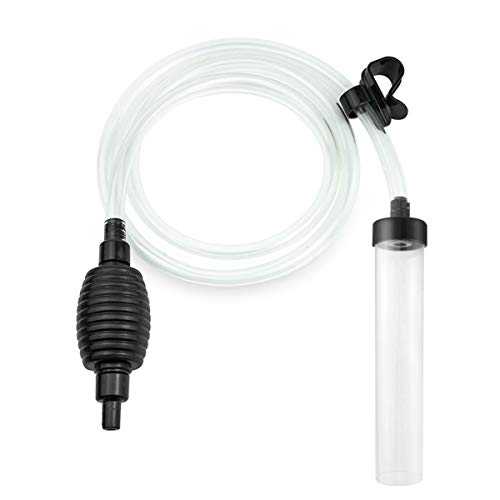[ad_1]
The obvious answer to this question would be YES. However, as first-time fish pet owners, being aware of the facts always helps. Knowing what to look out for and what kind of routine to follow contributes to the healthy lifestyle of a fish growing in captivity.
Housing a fish in your home is considered a sign of good luck and prosperity. However, do you think it would be possible if the fish didn’t stay in their best health? Pooping and peeing are part of their physiological needs. And, if your fish isn’t doing them correctly, the chances are that something is very wrong.
The excretion cycle is dependent on several factors. The kind of food they are eating, and also the environment they are in. Typically, being mindful of the poop and peeing cycle also helps you know when to clean the tank.
Since the fish stay in the same tank, they excrete in, thorough and frequent cleaning is a must. Leaving the tank as-is will result in higher levels of nitrate and ammonia. Both of these chemicals are responsible for causing stress and premature death too.
This article will delve into all the information one needs to know about a fish’s excretion. We will update you about every last detail that you need to know about.
Do Fish Poop and Pee?
Yes, fish do poop and pee as part of their normal physiological cycle. They excrete the waste generated in their body in the form of urine and faeces. Also, this is not an exception for some species but is a mandatory living cycle in just about every fish species you come across.
The fish living in the pond and the fish living in a fish tank, every one of them has similar body functions.
Like a typical mammal, even fish have two kidneys that help process waste products in the body. The size and structure of the kidney vary between the different fish species. However, the functions are standard. All of them filter out the waste products and help the fish live a healthy life.
However, one big difference between fish and other living beings is the frequency of their excretion. Unlike humans who pee every two to three hours, fish pee once a day. The reason behind this is the prolonged functioning of the kidney. The kidneys take a long period to complete the excretion process, which results in peeing or pooping once daily.
How to Fish Process Poop and Pee?
The main functional organ responsible for poop and peeing in a fish is the kidney. However, the function is a lot different in a fish than you’d witness in a human. The waste products are passed through the kidneys and then filtered out of the body. However, the process is quite different.
Let us walk you through the process in depth.
Peeing in Fish
As we said, fish have a pair of kidneys like most living beings. The size and structure vary, depending on the species and the size of the fish. However, their function is the same and helps filter out the waste products from the body.
The function of the kidneys in the fish is slow. Compared to their digestive organs, the kidneys process things a lot more slowly. So, it isn’t a question of why fish tend to pee a lot less, sometimes once a day.
While peeing, the urine is excreted through the orifice located near the tail of the fish. In some species, the excretion happens via the tail and gills too.
Another notable difference to the excretion process in the fish compared to humans is the presence of a bladder. The filtered waste in urine is directly excreted out of the kidneys without getting stored in the filtered.
The best way to check the levels of urine in the tank is by smelling the water. If the ammonia smell is prevalent, it means the tank water needs a change. Changing the water frequently is essential.
Pooping in Fish
Now that we have discussed the peeing process in the fish, let us move on to defecation. Like any other living being, the food consumed by the fish is processed by the digestive system. The processed food goes through the intestines and is excreted out of the anus.
Unlike peeing, which happens once every day, pooping happens every 48 hours. The process is quite extensive.
Ideally, like excess pee, you also need to be mindful of the poop. If you find large round pellets around the substrate, they are likely the poop. Just ensure that you either have a filter to clean up the accumulated waste or change the water frequently to prevent infections.
Also, the color of the fish poop differs varyingly. In some cases, you will find the fish poop to be of the color of the food they ingested. If the fish poop is highly red or brownish, they have likely eaten a lot of bloodworms. This helps you understand the dietary changes needed in the fish too.
If your fish eats a lot of greens and algae, you can expect their poop to be green in color. There’s nothing to worry about if you see the consistently changing color of their poop. However, white-colored fish poop is a red flag. It suggests that your fish is malnourished. So, get them onto a well-balanced and nutritional diet immediately.
How Often do Fish Poop?
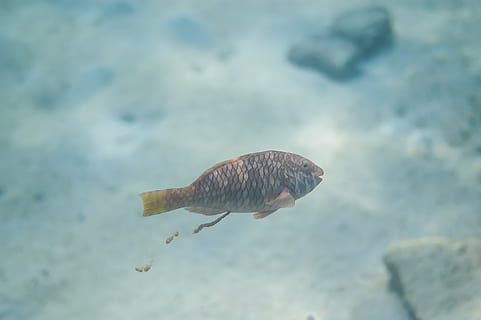
Although we have mentioned the frequency of the pooping and peeing above, let us reinstate things again. Compared to normal human beings and living beings, fish take a more extended period to pee and poop.
Fish generally pee once a day and poop every other day. The digestive system in their body is delayed throughout the process. The ingested food takes up to 2 days to completely pass through the digestive tract and then through the intestine to process completely.
For Freshwater Fish
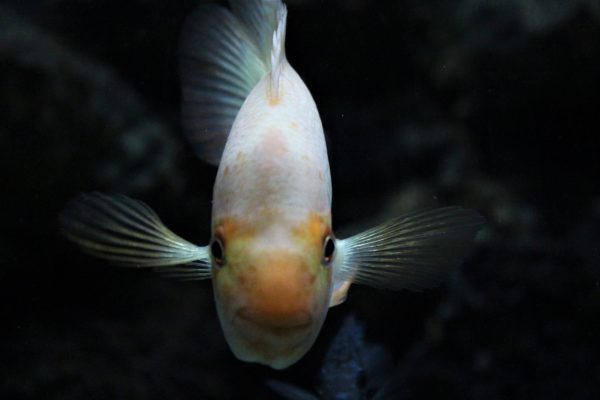
Freshwater fish live in salty lakes and water bodies. Despite their slender shape and structure, freshwater fish strive by retaining salts on their body. However, to keep a concentrated salt level in their body, they excrete a lot more water out of their body.
Their internal functions are devised in a way to retain salt in the body. So, freshwater fish tend to excrete a lot more water than the standard brackish water or saltwater fish.
The pee of a freshwater fish is very water and often contains little to no smell. This is because of the heavy retention of the salts and ammonia in their bodies.
For Saltwater Fish
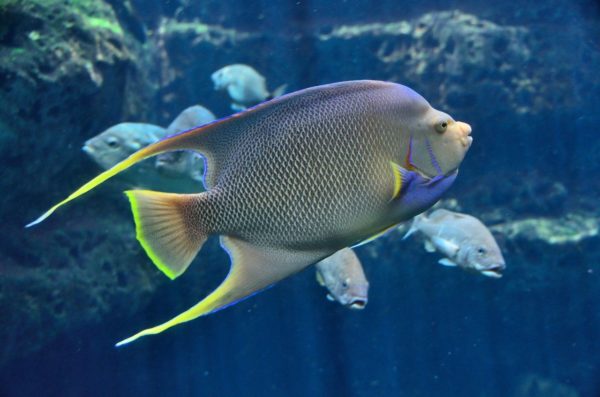
A complete 360 from the freshwater fish, the saltwater fish, do not need to retain excess salts in their body. Since they live in water bodies with concentrated levels of salt, their kidneys are developed similarly.
The kidney’s primary function in a saltwater fish is to excrete the excess salts from the body and retain the water. They tend to pee a lot less compared to freshwater fish. You will often find them excreting their waste products every two days. They mainly use skin and gills to excrete waste products.
Is Fish Poop Good for Plants?
Yes and No.
While fish poop is nutritional for some plants, it doesn’t work well for a few others. Typically, aquatic plants like coral reefs need the nutrients from fish poop to grow. Most of the aquatic plants which rely on fish poop need it for the nutritional value it provides.
Fish poop contains high levels of phosphorus and nitrogen, both of which are ideal for plant growth.
Besides the aquatic plants, even algae grow well when fed with fish poop in the bottom of the tank.
However, too much of anything is wrong. If the poop isn’t cleaning frequently, you will be left with a tank filled with algae. So, whatever you do, always ensure that you indulge in frequent cleaning, so it doesn’t disrupt the normal functioning of the plants.
Tips on Removing Poop from Fish Tank
Fish poop consists of nutrients but equally dangerous chemicals and parasites in them. Leaving them in the tank to rot is something you don’t want in the long run. Since fish poop has substance in them, it will settle down on the bottom of the tank as pellets do.
Switch off The Electrical Devices
There are ample electrical devices in the fish tank, including the filter, pump, and even the lights can impose risks of accidents. Since you will immerse your hand while cleaning the tank, any interaction with the electronics can risk electrocution.
Start with the Algae
When cleaning the fish poop and the tank in general, always start with the algae. The growth of algae becomes profound with the accumulation of fish poop. So, you want to ensure that you get rid of them as much as possible. Also, avoid scraping out everything, mainly if your fish depends on algae growth for their nutrition.
Using an algae scrapper is often the best option. It cleans the sides and also scrapes off the excess accumulated dirt on it.
Take out some water
Fish take some time to adapt to their water parameters. So, when it comes to cleaning the tank, the last thing you want to do is change 100% of the water without acclimatizing the fish first.
This is why it is always advised to start with changing 40-50% of the water. A gravel vacuum works miraculously for the same. This also helps eliminate the accumulated fish poop around the substrate.
Clean the Decorations
Yes, not just the sides of the tank and the water; you need to sanitize and clean the equipment too. Typically, during the life cycle, the fish will poop or pee randomly in the tank. Some of it might get stuck in the decorations and equipment.
Get the fake aquarium plants, caves and even the equipment like filters and pumps and cleanse them from the inside out. Make sure that there are no remnant poop or pee stuck on them. Also, when cleaning these items, use water that is isotonic to the tank water.
Prepare the Replacement Water
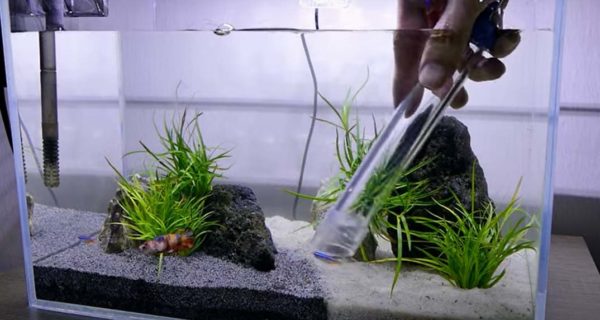
You can’t directly add tap water into your fish tank and consider it done. Fish doesn’t respond well to direct tap water, mainly because it has high chlorine levels in them. So, prepare the replacement water ahead of time. Treat the water with neutralizers and water conditioners to prepare it for the fish’s needs.
Once the water has been treated for 30 minutes to an hour, you can transfer the replacement water to the tank.
Clean the Exterior
Not just the inside; you need to be mindful of the exterior too. The constant water splashes and vaporization can lead to the accumulation of dirt on the outside. Typically, wet cloth and a sanitizing spray are enough to clean the outside.
Both the insides and the outsides of the fish tank should be cleaned at least once or twice a week. This depends on the amount of waste the fish generate.
Also, when cleaning, always ensure that the tank’s exterior remains dry. Being mindful of these steps will end that your tank remains clean and your fish stays healthy.
Wrapping Up
Keeping a check on your fish’s poop and pee is essential. They are crucial markers of their health and well-being. So, if something is wrong with their health, you can detect the same early. We hope this article gives you a complete rundown of everything related to a fish’s excretion. Also, be mindful of keeping the tank clean without any compromise. There’s no alternative to a clean tank for the optimal health of the fish.
[ad_2]
Source link

